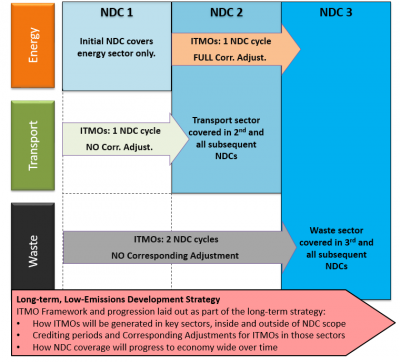Linking Mitigation Transfers to Long-Term Action Under the Paris Agreement
- Stacey Davis
- Sep 26, 2017
- 2 min read
“Cooperative Approaches” and “Internationally Transferred Mitigation Outcomes” under Article 6 of the Paris Agreement are among the most contested topics in the international climate negotiations. Some Parties are worried that a market for emissions reductions via internationally transferred mitigation outcomes can create perverse incentives to ambition, while others highlight the potential for markets to stimulate additional and more cost-effective investments in climate mitigation that can unlock the higher ambition needed to limit warming to less than 2° above pre-industrial levels. There is also a diversity of views on how, when, and under what circumstances Parties transferring mitigation outcomes are required to make a “Corresponding Adjustment.”
In our latest policy brief, “Using Transfers to Enhance Ambition over the NDC cycles,” CCAP offers some suggestions that could help reconcile these divergent viewpoints and overcome concerns by linking key features of transferred mitigation outcomes to the NDC cycles and long-term strategies. Through improved integration with the broader Paris Agreement framework, ITMOs can become an engine for expanded NDC coverage and enhanced ambition while facilitating transparency, predictability and global accounting. For example, CCAP recommends limiting the length of crediting periods for projects leading to ITMOs, tying the start and end of the crediting period to NDC cycle lengths, and ensuring that future baselines for generating mitigation outcomes include the emissions reductions achieved from any mitigation outcomes that were transferred.
CCAP also offers perspectives on corresponding adjustments for transferred mitigation outcomes that occur outside an NDC. While we agree it is ultimately desirable for all countries to have economy-wide goals and support use of a full and instantaneous corresponding adjustment for transfers from projects that are covered by a country’s NDC, we recognize that many Parties have not presented economy wide NDCs, often due to lack of data or experience. We propose a mechanism by which transfers can accelerate economy-wide coverage.
Specifically, a host country generating mitigation outcomes from outside the NDC must indicate when the source or sector in question will be covered in a future NDC. With this intention laid out, the host country could be allowed to transfer mitigation outcomes from sources not covered by an NDC, which would provide experience and capacity to mitigate emissions from additional sectors. Allowing offsets to be exported for a short period, say, one or two NDC cycles, may be justified if it can facilitate more rapid sector transformation and progression towards economy-wide coverage.
Finally, long-term, low greenhouse gas emissions development strategies developed by host and user countries should incorporate ITMO generation and use, providing transparency on how ITMOs will support increased ambition over time. Such planning will provide a guiding framework for policy development and ITMO approvals, and will also offer guidance to private actors looking to engage in ITMO projects and transactions.

For a fuller explanation of the proposed approach, take a look at CCAP’s policy brief. This policy brief was also one of the original submissions to the IETA Article 6 Submission Portal.


Comentarios